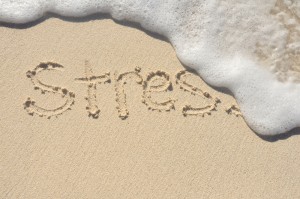Stress, is it really that bad??
You are stuck in traffic or on the tube and have an important meeting to get to….or your boss has given you another deadline meaning you need to work late again…Sound familiar?
Stress is a fact of our modern life and can be triggered by a multitude of situations which can be encountered on a daily basis, resulting in the recognisable stress or ‘fight or flight’ response. In small doses, positive stress, termed ‘eustress’, can actually be a positive factor in life, providing a big incentive to rise to whatever the challenge is, motivating us to be productive and get the job done. When acute stress becomes recurring or intolerable this is when ‘distress’ occurs and we can start to experience the negative effects of stress.
So what happens to our bodies during the stress response? Adrenaline is released causing a sharp increase in our heart rate and blood pressure, helping to get blood and vital oxygen to our brain and muscles, enabling a quick escape from whatever is stressing us (our stress response is a well preserved physiological mechanism from the dawn of humanity , when we needed to escape from predators!). Cortisol, the ‘stress hormone’ is released into the blood, prompting a surge in blood glucose from the body’s energy stores (liver & muscles), giving us the energy to escape danger/deal with an uncooperative colleague/parking ticket!
So this is all good stuff right?? Yes, in the short term…but if acute stress becomes a consistent feature or longer term chronic stress develops; the effect of sustaining this over a longer period takes its toll on the body. Over the medium to long term, the sustained increase in heart rate and high blood pressure which occurs during the stress response can increase the risk of heart disease or stroke. Whilst a sustained increase in cortisol levels can compromise the ability of our immune systems to fight infection and impairing healing and repair. Likewise hormone production is disrupted affecting efficiency and balance of many biological processes (such as reproductive function and increased risk of digestive ulcers). Significantly, all of these physiological adaptations occur silently in the background, with perhaps only reduced immune function may be noticeable, via increased susceptibility to colds or taking longer to recover.
As humans, one of our greatest strengths is our ability to physically and mentally adapt to situations, our muscles become stronger when we exercise them for example. Hans Selye, who pioneered research into the physiology of stress, found that humans and animals have a great capacity to adapt to stress. However, if stress becomes chronic and long term, we are programmed to adapt to this, possibly unaware that we are actually feeling regularly stressed. Our minds and bodies can compensate so far, before “de-compensation” occurs and we feel the negative effects of stress.
And this is the point of this piece, whilst acknowledging that stress is a fact of daily life and we have varying capacities to absorb, deal with or deflect those daily or longer term stresses, self awareness is key. Often it can be ‘the straw that breaks that camel’s back’ to make us realise that we are perhaps struggling to cope with too much and need to take some action.
As we have seen, on-going short or longer term stress can really wreak havoc on the body. A good regular self care routine, including good diet, regular exercise and enough sleep, is really effective at helping to prevent stress accumulating and having a negative impact on us. When we feel stressed, good habits can often fall by the wayside, making us reach for comfort food, high fat, salt and sugar snacks and that bottle of wine!
As a massage therapist, I recommend incorporating a regular restorative massage treatment into your self care routine. Massage therapy has been demonstrated to counteract the stress response and the negative effects associated with this, slowing breating and heart rates, promoting restoration and physical repair. Which is why incorporating regular massage treatment is beneficial for general wellbeing, along with many other benefits!
There are many other things which we can do to reduce the negative impacts of stress, including regular exercise, which is very effective at helping to lower stress levels, improve sleep quality and quantity (if affected) which in turns benefits our emotional resilience. Make time to do some activity or exercise you enjoy and the benefits will be clear. Yoga and mindfulness meditation are also very helpful. Unsurprisingly, also following a sensible, balanced diet and making sure you get enough good quality sleep are also important in helping to combat stress and promote physiological balance.
If you think that stress may be impacting you, it can be helpful to take some time to do an evaluation of what those contributing factors may be, and think about how you can implement a self care routine to help you help yourself!
References:
SK277, (2006), Stress, Life’s Challenges, The Open University, Milton Keynes
 Posted by bodyworks73
Posted by bodyworks73- Posted in Blog
 Sep, 20, 2015
Sep, 20, 2015 No Comments.
No Comments.
Testimonials
Catherine Mulligan
I was having difficulties running due to pain in my neck and back. Maria did a fantastic job of analysing the underlying issues causing the pain and tailoring the massages to solve them. Cannot recommend highly enough.
- Catherine Mulligan
I was having difficulties running due to pain in my neck and back. Maria did a fantastic job of analysing the underlying issues causing the pain and tailoring the massages to solve them. Cannot recommend highly enough.
- Catherine Mulligan
Kerttu Inkeronian
Maria is fantastic - as a climber I often get muscle pains, especially in the upper body, and Maria has never failed to cure these. She is very skilled and the massage is different every time, based on treatment needs. Highly recommended!
- Kerttu Inkeronian
Maria is fantastic - as a climber I often get muscle pains, especially in the upper body, and Maria has never failed to cure these. She is very skilled and the massage is different every time, based on treatment needs. Highly recommended!
- Kerttu Inkeronian
Dr. Jacques Behmoaras
I swim three times a week and get sometimes back or neck pain. I found the remedial massage extremely efficient as it allowed me to continue swimming in the same frequency, significantly reducing my back pain
- Dr. Jacques Behmoaras
I swim three times a week and get sometimes back or neck pain. I found the remedial massage extremely efficient as it allowed me to continue swimming in the same frequency, significantly reducing my back pain
- Dr. Jacques Behmoaras
Catherine Mulligan
I was having difficulties running due to pain in my neck and back. Maria did a fantastic job of analysing the underlying issues causing the pain and tailoring the massages to solve them. Cannot recommend highly enough
- Catherine Mulligan
I was having difficulties running due to pain in my neck and back. Maria did a fantastic job of analysing the underlying issues causing the pain and tailoring the massages to solve them. Cannot recommend highly enough
- Catherine Mulligan
Vicky Carling-Roberts
Having regular therapy has made a huge positive difference in reducing acute exacerbations of a recurring injury I had
- Vicky Carling-Roberts
Having regular therapy has made a huge positive difference in reducing acute exacerbations of a recurring injury I had
- Vicky Carling-Roberts

 Call Us (111) 234 - 5678
Call Us (111) 234 - 5678
